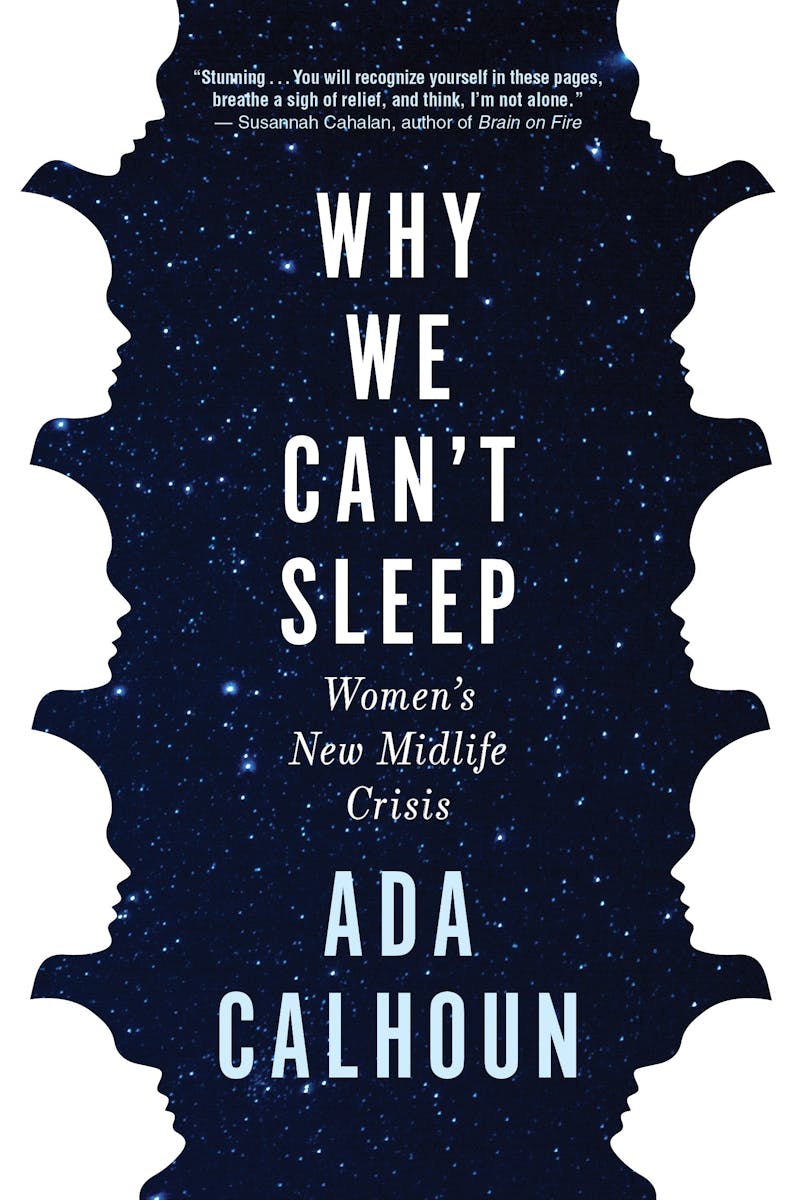The journalist Ada Calhoun opens Why We Can’t Sleep: Women’s New Midlife Crisis with the note, “You’re not just imagining it, and it’s not just you.” It’s less a dedication than a cri de coeur. Calhoun’s book is a personal matter, about the difficulties of her own middle age. But it also aspires to something larger than memoir. If it’s a truth that the middle years are universally a rut, there are, Calhoun argues, specific ways this plays out in the lives of women of her generation.
Calhoun begins with demographics, explaining that Generation X—the cohort of 55 million Americans born between 1965 and 1980, to which she belongs—are outnumbered by their parents (the population of Boomers is 76 million) and their successors (62 million millennials). Gen Xers are, she says, the Jan Brady of American life, outshone and overlooked. They are doomed, by the unforgiving math, never to comprise a dominant plurality in this country. A host of other factors, she argues, further affects women of her age, contributing to what is malaise at one extreme and existential reckoning at another.

I am an Xer, 42 years old, and I felt indicted by so much of Calhoun’s book, an engaging hybrid of first-person confession, reportage, pop culture analysis, and statistics. I nodded along as she wrote of the impossibility of balancing parenthood with professional ambition; I shuddered as she lamented her financial instability and lack of a plan for retirement. I recognized the feeling of vague discontent that she diagnosed as the remit of middle age. Reading Why We Can’t Sleep I worried I was premenopausal; testament, I think, to Calhoun’s powers of persuasion, since I’m a man.
There’s the conundrum. The author isn’t diagnosing a unique phenomenon. If you’re in your forties and feel vaguely unhappy, being told this is midlife crisis is almost mollifying; there’s some satisfaction in just giving it a name. Being told this has something to do with the specific forces that shaped your entire generation is more gratifying still. It’s not personal: It’s pathology.
Still, I accept most of Calhoun’s arguments, largely because they’re commonsensical. She is canny on the subject of women and professional ambition. Yes, women of her generation were raised more equitably than their mothers were. They expected to enter the workforce, sometimes carrying with them the burden of their mothers’ frustrated ambitions. Calhoun cites the seminal advertisement for Enjoli—in which a blonde transforms from corporate killer to saucy housewife—as representative of women’s naïve expectation that they could be breadwinner, sex kitten, and mommy at the same time. “The belief that girls could do anything morphed into a directive that they must do everything,” Calhoun writes. Indeed. We still talk about women having it all!
Television commercials like this had an adverse effect. It’s only rarely that my Netflix-watching children experience broadcast advertising (after one such episode, my older son told me we ought to consider buying an “all-new Chrysler Pacifica”). For Calhoun and her peers, ads for Slinky or Mentos are a common text. We have been primed our whole lives to want. This hasn’t got most of us anywhere but into debt.
We know, already, that middle-class comfort is harder to attain than it once was, and the author cites many studies to show how her generation has been betrayed by the collapse of that American dream. The state of the stock market at graduation, for example, will affect your career choice; entering the workforce during a strong economy is better for your wages over the long haul. You can even skip the studies for the simple historical record: “Gen X was hit hard by the 1987 market crash, the 1991–92 economic slowdown, and the dot-com bubble burst, setting off a recession—followed six months later by the terrorist attacks of September 11.” This grim recitation is familiar, and when you weigh it against the advantages of the previous generation (a vibrant postwar economy, just for starters)—well, no wonder the bitter riposte “OK, Boomer” has caught on.
I’m skeptical of Calhoun’s thesis that watching the Challenger explode on television in 1986 was psychically damaging, so much so that it may be the root of our desire to hover over our own kids. But I am persuaded by her assertion that there’s some particular trauma at play. We were latchkey kids, or the children of divorce (more widespread among our parents’ generation than theirs), raised to fear kidnappers. You can maybe understand our parental impulse to cosset. Unanswered, as yet, is what effect this will have in turn on the next generation.
Calhoun isn’t arguing that her generation discovered the midlife doldrums. Gen X has too low an opinion of itself to make so grand a claim. It’s a milestone like any other, one that transcends generational cliques. It is natural that this point in life—when your kids need you less urgently, your aging parents might require your assistance, your body undergoes significant physical changes, you have to reckon with the gulf between your ambitions and what you’ve accomplished in life thus far—might precipitate a crisis.
The book makes several fine points. Motherhood is full of invisible labor; ambition doesn’t solve all problems; social media is damaging. But none of these are especially fresh insights. We know why we can’t sleep. In the end you have to choose: rage at the way the world works or make some kind of bitter peace with it.
Why We Can’t Sleep isn’t really a work of policy, or social science, or even politics. More than anything it reminded me of a blog—we accompany a companionable presence through a particular set of challenges, then we leave her. Calhoun’s own story ends happily enough: That’s what we want for her, and that’s what we want for ourselves. I’m still not sleeping well, though.
